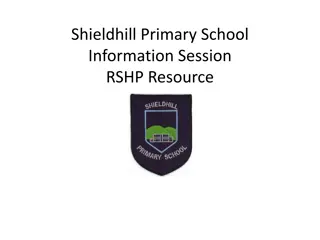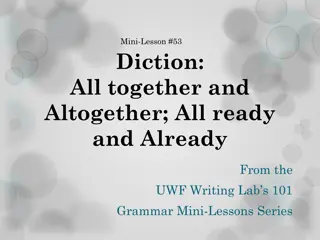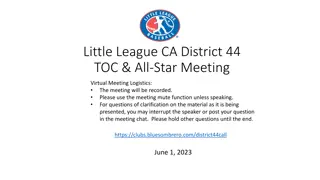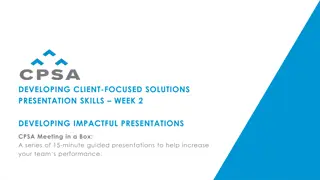
Understanding Parliamentary Procedure in Agriculture Science Classes
Explore the basics of parliamentary procedure in agricultural science classes, including main motions, debates, and voting processes. Learn about the importance of following rules for effective and fair meetings. Watch mock meetings and discover how to adopt main motions and make amendments for better decision-making.
Download Presentation

Please find below an Image/Link to download the presentation.
The content on the website is provided AS IS for your information and personal use only. It may not be sold, licensed, or shared on other websites without obtaining consent from the author. If you encounter any issues during the download, it is possible that the publisher has removed the file from their server.
You are allowed to download the files provided on this website for personal or commercial use, subject to the condition that they are used lawfully. All files are the property of their respective owners.
The content on the website is provided AS IS for your information and personal use only. It may not be sold, licensed, or shared on other websites without obtaining consent from the author.
E N D
Presentation Transcript
All in Favor? All Opposed? Grade 7-12, Agriculture Science Prepared by Ms. Gagne
Do Now List any meetings you have attended. It could be a club, sport, church or work related.
What is Parlimentary Procedure? A set of rules used to run a meeting that is effective and fair? In FFA we use the rules from Henry Robert in his book Robert s Rules of Order
Presenting a New Topic Main Motion- New idea to discuss with the group Second- some else wants to talk about this Debate- Discussion Vote- Do we do this or not?
Main Motion A main motion allows us to discuss an action we want to do or not to do. Uses the words I MOVE before what you want to do.
Main Motion Needs a second Is Debatable Can be changed or Amended Needs a MAJORITY Vote Can be taken as a voice vote
How to adopt a MAIN MOTION 1. Obtain recognition from the chair 2. I move That our chapter purchases a donkey 3. Second 4. Pro Debate 5. Against debate 6. Seeing no more debate we will begin to vote. 7. All those in favor say Yes 8. All those opposed say No 9. Our chapter will OR will not purchase a donkey.
Mock Meeting https://www.facebook.com/nathan.moyer.39/videos/1917043201683304/ https://www.youtube.com/watch?v=FfnBGolKmbM 4 mins-5:34
Where do we go from here? This class we did? Main Motions Next class we will do? How to change those motions (Amendments)
Lets Change It! Grade 7-12, Agriculture Science Prepared by Miss.Gagne
Do Now What is a main motion? Give an example.
RECAP Main Motion- Introduces new topic Requires a second Is debatable Majority Vote
Amendment Changes the motion on the floor. Can change any motion that brings up a new topic, has numbers or dates involved.
How to Amend a motion Strike out words: Example: Main Motion: I move to have ice cream at the next FFA meeting. Amendment: I move to amend the main motion by striking the words FFA meeting.
How to Amend a motion Insert or Add Example: Main Motion: I move to have ice cream at the next FFA meeting. Amendment: I move to amend the main motion by inserting the words and candy after the words Ice cream.
How to Amend a motion Combo (insert/add and striking out) Example: Main Motion: I move to have ice cream at the next FFA meeting. Amendment: I move to amend the main motion by striking the words FFA meeting and adding the words class tomorrow.
How to Pass an amendment 1. Main motion is pending 2. Get chair recognition 3. Make the motion to amend 4. Get a second 5. Debate 6. Vote 7. Go back to discussing the new main motion or original main motion
Mock Meeting Video https://www.youtube.com/watch?v=FfnBGolKmbM 5:50-7:30
Next Class What we did last class: Main motion What we did this class: Amendments to the main motion What are we doing next class: Adjourn
How do we end? Lesson Plan for Grade 7-12 agriculture sciences Prepared by Ms. Amanda
Do now Talk in pairs to answer the following questions: 1. If I want to introduce a new topic what motion do I used? 2. If i need to ask a question about parlimentary law what motion do I used? 3. What is a majority of 20 members? What is of 20 members?
Last man Standing First catcher: Name a motion Second catcher: does it need a second? Third Catcher: Can you debate it? Fourth Catcher: Vote required and name a motion.
Adjourn How do I word it? I move to adjourn
Second? Debate? Yes it needs a second No debate
Vote required? Majority
Mock Meeting The FFA chapter wants to host a fundraiser. Create a main motion along this subject. Perform the following motions: Main motion, amend, and adjourn. You need to earn 1.5 points this round.
Kahoot! https://play.kahoot.it/#/k/1f001224-37ca-4131-aa7c- cbfc3636ac78
What we did last class: Amendments What we did this class: Adjournment What are we doing next class: Asking questions during a meeting (Parlimentary inquiry and Question of privilege)
Aces in the Hole Grades 7-12 Agriculture Science Prepared by Miss Gagne Penn State Agriculture Education 2020
Do Now Fill in the following Chart: Motion Second Debatable? Amend? Vote required? Main Motion Amendment Adjourn
Do Now Motion Second Debatable? Amend? Vote required? Main Motion Yes Yes Yes Majority Amendment Yes Yes Yes Majority Adjourn yes no no Majority
Mock Meeting Senario: Your chapter wants to purchase new equipment for a lab. Discuss what would be beneficial. Think about machines, animals, plants or other items related to agriculture. We must . 1. Pass a main motion 2. Pass or fail and Amendment 3. Have a second and discussion
Mock Meeting We must . - Pass a main motion - Pass or fail and Amendment - Have a second and discussion **Please write down ANY questions that come to mind while this meeting is going on. Could be about the meeting or not.*
Questions that we had Insert questions the class had on this slide
Raise a question of privilege Used to ask a question NOT ABOUT PARLIMENTARY PROCEDURE that will benefit yourself or the group. No second, No debate, No vote
Raise a Question of Privilege - Not being able to hear the speaker - Open or close a window (Temperature/Noise)
How to Raise A question of Privilege Member: I raise a question of privilege Chair: State your question Member: The construction outside is making it hard to hear. Can we shut the window? Chair: Yes, we can. **Chair then goes back to whatever or whoever had the floor.*
Parli Quizzer Question 1. Does the motion Raise a question of privilege need a second? A Vote? Debate? 2. What is the purpose of the motion Raise a Question of Privilege?
Parliamentary Inquiry Used to ask a question about parlimentary Law! No second, Debate, Amendments or Votes Required. Chair answers the question
How to do a Parlimentary Inquiry Member: Parlimentary Inquiry Chair: State your inquiry Member: What are we currently discussing? Chair: We are currently discussing the amendment to the main motion. **Chair then goes back to whoever had the floor or back to business pending**
Parlimentary Inquiry Examples - What vote is required for this motion to pass - Ask if a motion is relevant (in order) at the moment? - Is this motion debatable? Amenable? - Ask what kind of vote can be taken? Voice? Ballot? Ect - What we are currently discussing
Mock Meeting Round 2 We must . - Pass or fail a main motion - Pass or fail and amendment - Raise a question of privilege - Show a Parlimentary Inquiry - Debate - Vote - Second
3-2-1 3 things you have learned about Parli Pro thus far 2 things you have questions on 1 thing you want to learn more about
What we did this class: Parlimentary Inquiry and Question of Privilege What are we doing next class: Ending debate and amendments on a motion Called Previous Question
Previous Question Prepared By Miss. Gagne 7-12th grade agriculture Science
Do Now: What does RONR say about a members right to debate? How can times can they debate and for how long?
Do Now 2 times for 10 mins each time/ debatable motion
Matches To discuss a topic - Main Motion To change a motion- Amend To ask a question on parlimentary Law- Parlimentary Inquiry To ask a question to benefit you or the group- Raise a question of Privilege To end the meeting- Adjourn To end debate/ amendments being made on the motion- Previous Question
Previous Question: What did we learn? **Capture what students learned for the worksheet here**
Previous Question Previous question, if passed, stops all discussion and making of amendments on the motion. A vote will be taken immediately!






















